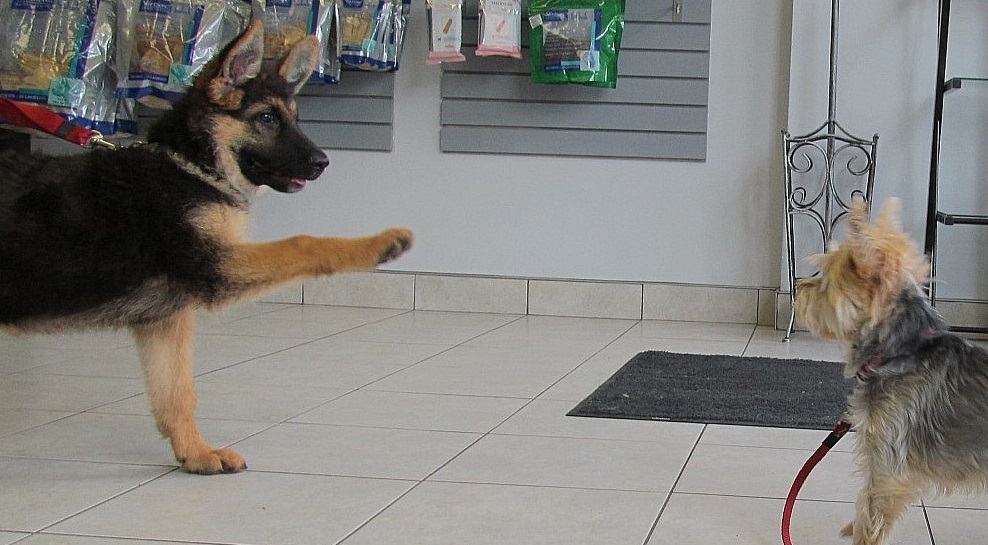What even experienced pet owners didn’t know:
Many of us, veterinarians, veterinary team members, and pet lovers have owned dogs or cats for years. We believe we know exactly what Fluffy or Fido are up to, we believe we are sure we have every action, need, and behavior figured out.… and often we are surprised when this is not so.

What does raising a forepaw mean?
“Humans like to see their pets through their own human eyes,” says Dr. Marsig, fear –free certified veterinarian with special interest in pet behaviour, working at a busy veterinary clinic in Markham. “We interpret their body language and their behaviour usually wrong. For instance when we people raise our upper lips and show our teeth, that is called smiling. A dog however makes the same facial expression to warn us that they may bite.”
Sadly, at our Markham vet clinic, we’ve come across our fair share of misconceptions. We’d like to address a few of them here and will continue this blog later.
Myth #1: Misreading an animal’s body language
A few things we’ve heard at our veterinary clinic include:
- “My dog smiles when I give her attention. I tried to pet her today and she bit me. What was going wrong?”
- “Sammy loves to have his belly rubbed. He rolls over and exposes his belly a lot.”
As humans, we express ourselves through speech or physical contact. For example, if we’re upset or feel threatened, we might yell or slam a door. Other humans in the area know to stay away, or else!
For dogs, it’s a completely different game. They can’t communicate the same way. Instead, they use mostly non-verbal cues and postures to get the point across.
They might freeze, pull their ears back, and ALWAYS move the upper lip before it escalates to biting. When owners don’t pay attention or ignore these signs, it definitely seems like an animal bit them out of the blue.
If a dog rolls on his back and exposes his belly, he’s saying he’s scared and doesn’t want any trouble. He is showing you his submission. When you then bend down and pet him, you’ll reinforce this behaviour and express your dominance over him. He will tolerate the petting and hold still, as he doesn’t want to challenge you.
Your trainer or veterinarian can help you pinpoint these cues.
Myth #2: You have to be dominant if you want your pet to behave and follow your “rules.”
A few things we’ve heard at our veterinary clinic include:
- “In our house, I’m the alpha. My dog isn’t allowed on the couch, so he knows who the boss is.”
- “You can’t let your pet rule the roost. You have to put them in their place without fail. They’ll learn eventually.”
Dogs and their ancestors, the wolves, live in packs with social hierarchy. There is an alpha wolf in every pack. Many owners (and some trainers) think humans must play the role of the alpha dog. In truth, one species can’t control the hierarchy of another species.
Yes, you can train your dog to do certain things and follow commands (“wait,” “shake,” etc.). This is called obedience, however the reason a dog is obedient is not that she feels inferior to you, but that there is a benefit to responding to your command. If they’re not getting something out of it (like a treat), you won’t get the results you want. As any veterinarian would tell you, reinforcement and consistency are very important. If a dog is not obedient, then you have not been clear about what you want them to do.
Remember: humans can’t be the alpha dog. Even your local vet could never earn that role. If you don’t want your pooch napping on the couch, then you have to give him something pleasant (try “attention”) when he is not on the couch.
If you don’t want your cat to jump onto the kitchen counter, then you need to feed it food that is only available on the floor. I suggest cat food. Don’t give your cat chicken left overs on the floor. Next time it chicken is on the table, your cat may be tempted to jump up and grab it “saving you the effort of putting it into the cat bowl”. If you never give chicken, your cat won’t know that she should get it again.
For more information on Fear Free Certifications click here. Moe behaviour tips can be found here and here.
If you found this blog informative, please share it with your friends on Facebook . Please call us (905)477-2323 for any questions or search for more articles on our website: http://unionvet.ca/resources/client-education/
Sincerely,
Dr. Ernst Marsig, veterinarian in Markham
Fear Free Certified Practitioner
Practicing Veterinary Medicine in Markham for a Long and Happy Life of ALL Your Pets.
Animal Hospital of Unionville, a veterinary clinic on the north side of Hwy 7, serving all pets in Markham, Richmond Hill, Scarborough, Stouffville, and North York since 1966. We are your family vets for dogs, cats, pocket pets (rabbits, chinchillas, gerbils, mice, rats, hamsters, guinea pigs, skinny pigs, etc.), ferrets, and birds (budgies, cockatiel, parrots, amazon, cockatoo, love birds, conures, African greys, finches, canaries, etc.). We pride ourselves to provide cost effective veterinary medicine and give you options for treatments. Some may think our services as cheap, but our goal is to give good value.
Disclaimer: No part of this website constitutes medical advice. Readers are advised to consult with their veterinarian.

